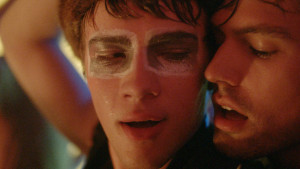
Walking into Hide Your Smiling Faces cold, not a trailer watched or full review read, might have been the best decision I could have ever made. From day one, the title, poster, and synopsis kept me curious. The comparisons to Stand by Me — a film that I’ve never cared for but seems to be everyone’s go-to for coming-of-age masterpiece — kept me at arm’s length. The comparisons aren’t unwarranted, as Daniel Patrick Carbone’s debut certainly has a fair share in common with the eighties flick, but this film’s focus strikes a much deeper chord with me than that one ever could.
It’s a bold statement, no doubt, but one that rings true to me. The film is a simple one, presenting young brothers confronted with the overwhelming notion of death in more ways than one. To some, that kind of narrative doesn’t offer much. It’s heavily fueled by introspection rather than action, and the pacing is set up perfectly with its impacting opening shot: the image of a snake struggling to devour a dead animal to nourish itself. To put it bluntly, it goes to show how hard death is to swallow.
And that’s something practically everyone has to face at one point or another. The unavoidable truth is that someone has or will die around you at some point, and so will you (unless you’re a vampire, in which case you’d probably be less melancholy about it all; that is, unless you’re a suicidal vampire in a Jim Jarmusch film). But death never feels like something that comes out of nowhere in Hide Your Smiling Faces. Death is established as a mood, an atmosphere that invades every bit of the film, from the very moment that a gun enters their lives. Many have discussed that it never went off, never killed anyone, but just because a bullet never left that weapon doesn’t mean it didn’t do exactly that. Gun in hand, a father tells a son to go cry in the woods. Minutes later, he’s found dead. Whether he fell off the bridge or jumped off is a question that plagues everyone in the film.
That singular event opens the floor for Daniel Patrick Carbone to explore the way death impacts each of his characters. The eldest brother and his best friend, the two who initially find the body, react completely differently at first. One cries by the body, without a clue what happened, while the other stands and waits. These roles are reversed quickly enough, as we realize that his best friend suffers from depression. In fact, as overtly as his depression is expressed (something that some might argue isn’t exactly subtle), you could say every character in the film has experienced depression to some extent.
More importantly, this child’s death offers the potential for musings on what can come of depression; namely, suicide. One boy asks the other, “Have you ever thought about jumping?” They all have, however hesitant they are to admit it. Just as I, and likely many of the film’s viewers, have thought of doing the same. What that state of mind comes from varies (grief from death, feelings of isolation, the questioning of sexuality; all of which are depicted in the film). And at no point does Carbone shame people into not feeling this way. So many films take a harsh stance on the subject, telling folks it’s immoral to feel like there’s no other route out, that you’d be destroying the lives of other people, but Hide Your Smiling Faces doesn’t. It plainly and simply shows the aftermath of what could have potentially been one, and it shows the many ways that those of us still living — and potentially suffering — are facing ourselves.
It also, in the smallest amount, shows us just how impossible it is for anyone to explain away what’s happened. The mother of both the boys cries maniacally, surely reflecting on the fact that it could have been one of her own children who died, but the presence of other community members is what shows this best. Young adults and children struggle to find logic in death, especially those without a full grasp of what’s just happened to them. Adults and pastors offer excuses — “God works in mysterious ways,” one says — but they ring as false here as they do in real life. Carbone never discredits the notion that faith can be a helpful tool for those grieving, but the way the boys react to hearing those things is honest. Who hasn’t felt that those words weren’t nearly enough?
I have no idea whether or not the title of the film’s been discussed in detail, but, for me, it’s an apt way of turning what people always say on its ass. People, and women especially, are constantly faced with being approached when they’re sad — told to “turn that frown upside-down” or whatever saying fits the moment best. No matter what kind of childhood you have, be it the introverted kind typically shown or one of active exploration like the youth in this film, we always hide the pain and force a smile. Hide Your Smiling Faces says something different. It shows us (and whatever teen is lucky enough to be exposed to this) that hiding that smile you’re always forced to put on is a necessity, because constantly faking that upbeat attitude eats away at you just as slowly as a snake choking on its prey.
—
Hide Your Smiling Faces is currently available for rental or purchase on Amazon Instant Video.
Directed by Daniel Patrick Carbone; written by Daniel Patrick Carbone; starring Ryan Jones, Nathan Varnson, Colm O’Leary, Thomas Cruz, Christina Starbuck, and Chris Kies; 81 minutes.



 Derek
Derek
 Isabelle
Isabelle